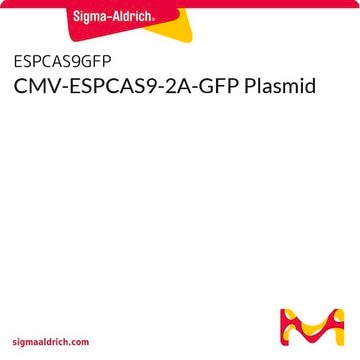CLL1032
U2OS GFP-ACTB
human female bone (Disease source: Osteosarcoma)
Sign Into View Organizational & Contract Pricing
All Photos(2)
About This Item
UNSPSC Code:
41106514
NACRES:
NA.81
Recommended Products
product name
U2OS GFP-ACTB,
biological source
human female bone (Source Disease: Osteosarcoma)
Quality Level
OMIM accession no.
storage temp.
−196°C
Gene Information
human ... beta actin(60)
General description
This product was derived from ATCC Cat. No. HTB-96.
ACTB (actin beta) gene codes for β-actin. It is a cytoskeletal housekeeping protein. It is present in the cytoplasm. The ACTB gene is located on human chromosome 7p22.1. GFP (green fluorescent protein) is a major reporter protein that has fluorescence properties. It can fluoresce without the help of any cofactors or substrates except for oxygen.
ACTB (actin beta) gene codes for β-actin. It is a cytoskeletal housekeeping protein. It is present in the cytoplasm. The ACTB gene is located on human chromosome 7p22.1. GFP (green fluorescent protein) is a major reporter protein that has fluorescence properties. It can fluoresce without the help of any cofactors or substrates except for oxygen.
U2OS GFP-ACTB are osteosarcoma, epithelial cells, from a human caucasian female (aged 15 years), with a GFP-tagged modification.
Application
This product is a human U2OS cell line in which the genomic ACTB gene has been endogenously tagged with a Green Fluorescent Protein (GFP) gene using CompoZr® Zinc Finger Nuclease technology. Integration resulted in endogenous expression of the fusion protein in which GFP is attached to the N-terminus of actin. Fluorescence imaging shows that the actin can polymerize to form the characteristic pattern of actin filaments. This stable cell line was expanded from a single clone. The target′s gene regulation and corresponding protein function are preserved in contrast to cell lines with overexpression via an exogenous promoter.
To learn more, please visit the Cellular Reporter Cell Line webpage
Biochem/physiol Actions
β-Actin modulates cell growth, migration and the G-actin pool. Mutations in ACTB leads to pleiotropic developmental disorder. GFP (green fluorescent protein) is used for quantitative analysis.
Actin β (ACTB) is an abundant cytoskeletal housekeeping protein. The protein, expressed in the nucleus, controls gene expression, cell division and proliferation. ACTB is generally used as a reference gene in measuring expression levels in tumors.
Features and Benefits
GFP-tagged on chromosome 7p22.1
The U2OS cells are adherent, with a doubling time of approx. 29 hours.
Components
U2OS GFP-ACTB cells
Quality
Tested for Mycoplasma, sterility, post-freeze viability, short terminal repeat (STR) analysis for cell line identification, PCR assay for cell line species confirmation.
Preparation Note
Media Renewal changes two to three times per week.
Rapidly thaw vial by gentle agitation in 37°C water bath (~2 minutes), keeping vial cap out of the water. Decontaminate with 70% ethanol, add 9 mL culture media and centrifuge 125 x g (5-7 minutes). Resuspend in complete culture media and incubate at 37°C in a 5% CO2 atmosphere.
Subculture Ratio: approx. 1:3-1:6
The base medium for this cell line is McCoy′s 5A1 Medium Modified, Cat. No. M9309. To make the complete growth medium, add the following components to the base medium: fetal bovine serum, Cat. No. F4135, to a final concentration of 10%.
The cell freezing medium is DMSO 1X (Cat. No. C6164).
Rapidly thaw vial by gentle agitation in 37°C water bath (~2 minutes), keeping vial cap out of the water. Decontaminate with 70% ethanol, add 9 mL culture media and centrifuge 125 x g (5-7 minutes). Resuspend in complete culture media and incubate at 37°C in a 5% CO2 atmosphere.
Subculture Ratio: approx. 1:3-1:6
The base medium for this cell line is McCoy′s 5A1 Medium Modified, Cat. No. M9309. To make the complete growth medium, add the following components to the base medium: fetal bovine serum, Cat. No. F4135, to a final concentration of 10%.
The cell freezing medium is DMSO 1X (Cat. No. C6164).
Legal Information
CompoZr is a registered trademark of Merck KGaA, Darmstadt, Germany
Disclaimer
RESEARCH USE ONLY. This product is regulated in France when intended to be used for scientific purposes, including for import and export activities (Article L 1211-1 paragraph 2 of the Public Health Code). The purchaser (i.e. enduser) is required to obtain an import authorization from the France Ministry of Research referred in the Article L1245-5-1 II. of Public Health Code. By ordering this product, you are confirming that you have obtained the proper import authorization.
Storage Class Code
12 - Non Combustible Liquids
WGK
WGK 3
Flash Point(F)
Not applicable
Flash Point(C)
Not applicable
Certificates of Analysis (COA)
Search for Certificates of Analysis (COA) by entering the products Lot/Batch Number. Lot and Batch Numbers can be found on a product’s label following the words ‘Lot’ or ‘Batch’.
Already Own This Product?
Find documentation for the products that you have recently purchased in the Document Library.
Customers Also Viewed
Animal Cell Culture (2014)
Lia Prevedello et al.
Annals of biomedical engineering, 47(1), 231-242 (2018-09-16)
Mechanical stress has been proven to be an important factor interfering with many biological functions through mechano-sensitive elements within the cells. Despite the current interest in mechano-transduction, the development of suitable experimental tools is still characterized by the strife to
ACTB in cancer.
Guo C, et al.
Clinica Chimica Acta; International Journal of Clinical Chemistry, 417, 39-44 (2013)
Exosomes Derived from Squamous Head and Neck Cancer Promote Cell Survival after Ionizing Radiation.
Lisa M, et al.
PLoS ONE, 11(3), e0152213-e0152213 (2016)
Tina M Bunnell et al.
Molecular biology of the cell, 22(21), 4047-4058 (2011-09-09)
Ubiquitously expressed β-actin and γ-actin isoforms play critical roles in most cellular processes; however, their unique contributions are not well understood. We generated whole-body β-actin-knockout (Actb(-/-)) mice and demonstrated that β-actin is required for early embryonic development. Lethality of Actb(-/-)
Our team of scientists has experience in all areas of research including Life Science, Material Science, Chemical Synthesis, Chromatography, Analytical and many others.
Contact Technical Service










